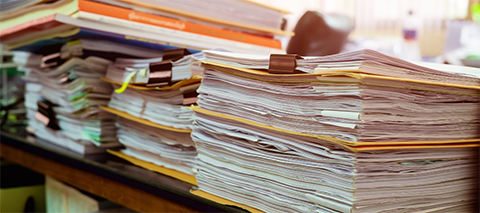Our annual Shred Day is approaching and (if you’re anything like us) you likely have mounds of paper documents just waiting to be sorted. Fortunately for all of us, on Saturday, April 22, 2023, (which happens to be Earth Day), Willamette Valley residents are invited to bring their sensitive documents to the Maps High Street Branch and Professional Center (465 Division St NE in Salem) between 9 am and 1 pm, to be shredded and securely disposed of.
The event is FREE and open to the public. Participants do not have to be Maps members to shred. Those who wish to participate can bring two mid-size boxes of documents to be shredded. Stapled documents can be shredded, however, documents in binders and documents bound with metal binder clips cannot. Those wishing to shred are asked to remove items larger than staples and paper clips before dropping off their boxes.
This is a drive-up event and participants are asked to enter the parking lot from the Division Street entrance and exit at High Street.
Why Shred?

If you are tossing mail, bills, and other documents in the trash, you are opening yourself up to tremendous risk. According to Iron Mountain (our partners for this event), anything that has a signature, account number, or social security number should be shredded—as well as anything that contains medical or legal information. Unfortunately, there is no law preventing people from going through your trash and the things you throw away could be useful for a thief looking to commit identity theft or fraud.
Shredding can not only help you prevent identity theft and data breaches but also help you free up much-needed space in your home. Plus (thanks to the sustainability efforts of secure disposal companies like Iron Mountain), shredding is a more environmentally friendly way to dispose of your paper trash. In the United States alone, we consume more than 80 million tons of paper annually. Meanwhile, a single large Iron Mountain facility can destroy and prepare almost 50,000 tons of paper for recycling per year.
Wondering what to shred?
When in doubt, shred it! Follow these tips when deciding what to include in your shred box:
What to Destroy Immediately
- Paid Bills
- Credit Card Offers
- Junk Mail
- Travel Itineraries
- Boarding Passes
- Shipping Labels
- Cancelled Checks
- Credit Reports and Histories
- Old Resumes and curriculum vitae
- Sales Receipts for Items Without Warranty (After you’ve reconciled them with your bank statement)
- ATM Receipts (After you’ve reconciled them with your bank statement)
Destroy After 30 to 60 Days
- Checks Deposited Via Mobile Banking: It’s okay to destroy these after you’ve reconciled them with your bank statement.
- Credit Card Statements: In general, it’s best to keep your credit card statements for at least 60 days unless you need them as proof of purchase for your tax records.
- Bank/Credit Union Statements: Statements from your bank of credit union should be kept for 30 to 45 days unless they contain tax-related information.
Destroy After One Year
- Paychecks and Pay Stubs: Keep your payroll records for one year or until you receive your W-2 statement for that tax year.
Destroy After Seven Years
- Tax Documents: You should save all tax records for at least seven years. This includes all filings and accompanying documents (like W-2s, 1099s, and receipts).
- Investment Records: Keep track of any investment records (like end-of-year summaries, brokerage statements, college savings plan statements, and retirement savings plan records) for at least seven years (even after you have closed the accounts).
Situation-Dependent Documents
- Leases and rental agreements: Keep a record of your lease or rental agreement until you have moved out of your home and have received your deposit back from your former landlord.
- IRA Contribution Records: Keep your IRA contribution records until you withdraw the money (and even then, it’s best to save them for 7 years, just to be certain). Quarterly statements can be shredded soon as soon as they are matched up with your yearly statement.
- Warranty-Related Sales Receipts: Keep the receipt for anything you purchase under warranty for at least the life of the warranty.
- Home Purchase/Sale Records: Financial experts recommend saving home purchase and sale records for at least seven years after your home sale, but it is best to keep copies of these records for as long as you own the home + 7 years (based on IRS timelines).
- Home Improvement Receipts: Keep your home improvement records indefinitely or until the home is sold. After that, you can pass copies of the records on to the next homeowner or destroy them.
- Vehicle Records: Keep your vehicle records (including maintenance and repair records) until you sell or get rid of the vehicle. After that, you can pass copies of the records on to the next owner or destroy them. The same goes for boats, motorcycles, or RVs.
- Insurance Records: It’s best to keep your insurance records (medical, home, life, etc.) for at least 5 years after the life of the policy.
- Medical Records: It is wise to keep your medical records and bills for at least 1 year, but often a good idea to keep them around a little longer in case there is a dispute over a reimbursement. Some experts suggest you keep medical records for 5 years from the date of your last treatment for any specific illness or ailment. This means hanging on to prescription information, medical histories, health insurance details, and contact information for your physician.
- Wills and Living Wills: Wills and living wills that are not in effect should be kept indefinitely. Wills that have gone into effect should be kept for at least 7 years after the person’s death or the closing of the person’s estate—whichever is later. If you have made changes to your will, the old copies are usually destroyed, but it’s best to consult your attorney on this matter before doing so. They may request that you keep the old versions as a testament to your intent.
What to Save Forever
Some documents should be saved indefinitely. These vital documents should be kept in a fireproof safe and—if possible—additional copies should be kept electronically in secure cloud storage.
- Birth Certificates
- Death Certificates
- Social Security Cards
- Citizenship Records
- Marriage or Divorce Decrees
- Adoption Papers
- Military Records
- Retirement and Pension Records
- Life Insurance Records
- Beneficiary Forms
- Academic Records
